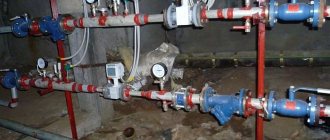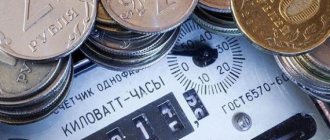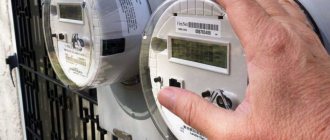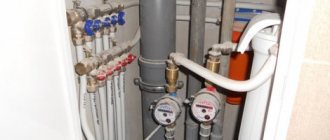Can the management authority charge residents an additional fee for replacing the ODPU
12/03/2020
ODPU is established at the expense of capital repair funds or additional contributions from owners
In accordance with Part 2 of Art. 9 No. 279-FZ, in all apartment buildings, if technically possible, a common building heat energy meter must be installed and put into operation. The organization managing the house should inform the owners about this.
According to Part 2 of Art. 166 of the Housing Code of the Russian Federation, it is possible to install a common house meter, including thermal energy, as part of a major overhaul of the common property of the owners. If the owners do not depend on the timing of the regional program, accumulating funds in a special account, then they can conduct an OSS and approve the installation of the ODPU on it as part of the overhaul.
The owners, whose contributions go to the operator for major repairs, will have this opportunity only when it is their turn to carry out capital work. Otherwise, at the OSS, they must decide from what funds the purchase and installation of ODPU heat will be financed.
If the owners of the OSS do not decide to install the meter and finance the work, then the RSO has the right to install the ODPU independently until January 1, 2021, and then recover the cost of the device and installation from the owners of the premises in the house.
Replacing a failed ODPU is work on the maintenance and current repair of common property
After installation, the ODPU is included in the general property of the apartment building and the organization managing the building or the HOA is responsible for its working condition (Article 36 of the Housing Code of the Russian Federation, clauses 5-7 of the RF PP No. 491, clause 18 of the RF PP No. 290)
Its maintenance and repairs must be planned by the management as part of the work on maintaining the common property of the owners of premises in the apartment building and carried out at the expense of the funds that the residents of the house pay monthly for the maintenance of the residential premises (clause 5, part 1.1, article 161 of the Housing Code of the Russian Federation, resolution of the Presidium of the Supreme Arbitration Court RF dated September 29, 2010 No. 6464/10).
If a common house heat meter fails, then its functionality and technical characteristics must be restored no later than two months after the fact of the breakdown has been recorded (Part 12, Article 13 No. 261-FZ).
The work of the management authority to maintain the ODPU in proper condition includes not only repairing the meter if it is faulty, but also replacing it if it is impossible to restore the functionality of the device through partial repairs. In this case, a report on the failure of the ODPU is drawn up.
Keep in mind
Management organizations must remember that all apartment buildings where there is a technical possibility must be equipped with a common building heat meter. The issue of its installation and source of financing must be brought to the attention of the OSS.
If the ODPU is installed for the first time, then such work can be included in the list of works on major repairs of the common property of an apartment building. If the owners of the OSS refuse to install the heat distribution system, the resource supplying organization will do so forcibly and recover costs from the owners.
Replacing a failed common building meter refers to routine repairs and work to maintain the common property of the apartment building in proper condition. The management organization has the right to collect additional contributions from the residents of the house to replace the ODPU only if the owners of the OSS make an appropriate decision.
Installation of common house metering devices
List of residential buildings in which, in accordance with the requirements of Federal Law No. 261, the heat resource supplier has installed common house metering devices. The file also indicates the cost of the metering device, how it is determined, see the answer to question 5.
1. What law obliges residents to install collective (common building) metering devices (hereinafter referred to as ODPU) for electrical and/or thermal energy in apartment buildings?
Answer
: Federal Law N 261-FZ “On energy saving and increasing energy efficiency and on introducing amendments to certain legislative acts of the Russian Federation” dated November 23, 2009.
2. Who is responsible for equipping an apartment building with a residential building ?
Answer:
Until July 1, 2012, the obligation to ensure that houses are equipped with metering devices for the resources used: water, thermal energy, electrical energy, as well as putting the installed metering devices into operation, was assigned to the owners of premises in apartment buildings put into operation on the day the Federal Law came into force “ About energy saving".
If the owners fail to fulfill the obligation to install ODPU within the specified period, the organizations that supply water, thermal energy, electrical energy or their transmission and whose engineering support networks are directly connected to the networks of the apartment building must equip apartment buildings with ODPU.
(Federal Law No. 261-FZ of November 23, 2009)
3. Who should pay for the installation costs of the ODPU?
Answer:
In accordance with Part 12 of Article 13 of the Federal Law “On Energy Saving and Increased Energy Efficiency and on Amendments to Certain Legislative Acts of the Russian Federation”, owners of premises (both residential and non-residential) are required to pay the costs of installing a collective (common house) metering device .
Also, according to clause 38(1) of the Government of the Russian Federation of August 13, 2006 N 491 “On approval of the Rules for the maintenance of common property in an apartment building...” If the owners of premises in an apartment building did not ensure that such a house was equipped with a collective building before January 1, 2013 a common house) metering device for the used communal resource, and at the same time, in accordance with Part 12 of Article 13 of the Federal Law “On Energy Saving and Increasing Energy Efficiency and on Amendments to Certain Legislative Acts of the Russian Federation”, a collective (common house) metering device was installed, the owners of the premises are obliged pay the costs of installing such a metering device, except for cases where such costs were taken into account as part of the fee for the maintenance and repair of residential premises and (or) as part of the mandatory payments established for members of a homeowners’ association or a housing cooperative or other specialized consumer cooperative and ( or) contributions related to the payment of expenses for maintenance, current and major repairs of common property.
4. Why didn’t the supplier of thermal resources gather the owners and decide to install the ODPU himself?
Answer:
The installation was carried out in accordance with the requirements of Federal Law N 261-FZ dated November 23, 2009. forcibly in apartment buildings in which the owners of the premises have not fulfilled the obligation to install common building heat energy and/or hot water meters in their houses by 07/01/2012. Compulsory installation does not imply holding meetings of premises owners in apartment buildings. At the same time, the owners of the premises are obliged to pay the costs of the heating resource supplier for the installation of the heat supply system; if they refuse to pay, the costs will be recovered in court.
5. How is the cost of the access control system with which an apartment building is equipped determined?
Answer:
The cost of the DPPU includes the costs of the organization that, in accordance with Part 12 of Article 13 of the Federal Law “On Energy Saving and Increasing Energy Efficiency and on Amendments to Certain Legislative Acts of the Russian Federation,” installed a collective (common house) metering device (based on invoices (estimates) )). And it depends on a number of interrelated factors:
- on the cross-sectional diameter of the pipeline, which is different in each house,
- depending on the configuration of the devices, which is different in each specific case,
- from the nuances of its installation.
In addition, the letter of the Ministry of Construction and Housing and Communal Services of the Russian Federation dated April 9, 2014 N 5792-MS/04 clarified that when installing metering devices without installment plans, the expenses of organizations for installing metering devices for used energy resources consist, among other things, of : the cost of the metering device, the cost of developing design documentation for the equipment of the metering unit, its installation and commissioning.
6. Is the payment for OAPU the same for owners of residential and non-residential premises in apartment buildings?
Answer:
In accordance with clause 28. Resolution of the Government of the Russian Federation of August 13, 2006 N 491 “On approval of the Rules for the maintenance of common property in an apartment building...”: Owners of premises are required to bear the burden of expenses for the maintenance of common property in proportion to their shares in the right of common ownership of this property. Thus, the mechanism for calculating fees is the same for owners of residential and non-residential premises and is determined in proportion to the area of the premises owned.
7. How is the amount of the payment for the public access control facility determined for each premises?
Answer:
The Decree of the Government of the Russian Federation of August 13, 2006 N 491 “On approval of the Rules for the maintenance of common property in an apartment building...” clause 38(1) states: The share of costs for installing a collective (common house) metering device, the burden of which is borne by the owner of the premises, is determined in proportion to the share in the right of common ownership of common property.
8. Is it necessary to pay the entire amount at once?
Answer:
For owners of non-residential premises - mandatory. For citizens who own premises in apartment buildings, the law provides for the right to installment plans for a period not exceeding 5 years. Owners of residential premises can pay the costs of the organizations specified in the Federal Law “On Energy Saving and on Increasing Energy Efficiency and on Amendments to Certain Legislative Acts of the Russian Federation” for the installation of these metering devices in equal shares within 5 years from the date of installation of the ODPU, provided that they there is no expressed intention to pay such expenses at a time or with a shorter installment period.
9. What is the “price” of installment plans?
Answer:
If an installment plan is granted, the costs of installing meters for energy resources used are subject to increase by the amount of interest accrued in connection with the provision of an installment plan, but not more than in the amount of the refinancing rate of the Central Bank of the Russian Federation in effect on the date of accrual.
(Article 13, paragraph 12 of Federal Law No. 261-FZ of November 23, 2009)
10. Can consumers verify the correctness of the costs presented for payment for the installation of ODPU?
Answer:
Yes, you can send a corresponding request to the resource supply company, which independently (or with the involvement of another organization) carried out the installation of the ODPU and submitted an invoice for reimbursement of its costs.
If you disagree with the amount of costs indicated in the invoice for the installation of a collective (common house) metering device and (or) the share of expenses allocated to it, the owner of the premises has the right to appeal to the organization that installed such a metering device and issued the invoice with disagreements, and if disagreements are not resolved, he has the right to appeal invoice issued in the manner established by the legislation of the Russian Federation. (clause 38(1) of section III of the Decree of the Government of the Russian Federation of August 13, 2006 N 491).
11. What are the sanctions for non-payment of the MTPL?
Answer:
The law provides, firstly, for the accrual of penalties on the unpaid amount, and also, if the Owner refuses to pay the costs voluntarily, he will be obliged to pay the costs incurred by the organizations that established the ADP in connection with the need for forced collection.
12. Will ODPU be installed in all apartment buildings?
Answer:
Requirements regarding the organization of accounting of used energy resources do not apply to facilities whose power consumption of electrical energy is less than five kilowatts (in relation to the organization of accounting of electrical energy used) or the maximum volume of thermal energy consumption of which is less than two tenths of a gigacalorie per hour (in relation to organization of accounting of used thermal energy) (Article 13. clause 1. Federal Law No. 261-FZ of November 23, 2009).
13. Can consumers refuse calculations made on the basis of the DTPU?
Answer:
No. Payments for energy resources must be carried out on the basis of data on the quantitative value of energy resources, determined using metering devices for energy resources used, starting from the month following the month of putting these metering devices into operation (clause 2 of Article 13 of the Federal Law “On Energy Saving” and on increasing energy efficiency and on introducing amendments to certain legislative acts of the Russian Federation").
14. How can I find out exactly where the ODPU for my home is installed, and who is responsible for providing access to the ODPU if I, as the owner, want to view it?
Answer:
On this issue, you can contact the service/management organization of the apartment building.
15. I received an invoice to pay the costs of installing the ODPU, but I plan to sell the apartment.
Who is responsible for paying expenses after the sale? Answer: After the purchase and sale of an apartment, its new owner must continue to pay the costs of installing the ODPU.
Household heat metering units
The installation of a common house heat meter, agreed with the heating company, is an effective step towards reducing the cost of heating a home.
According to Government Decree No. 344, starting from 2013, payment for heat is charged only according to data from measuring instruments, which is mandatory for the entire population. This is also stated in Federal Law No. 261, which regulates energy saving issues. Thus, utility bills are calculated based on the readings of consumed resources, taking into account current tariffs. Therefore, installation and timely replacement of a common house meter is compliance with the legislation of the Russian Federation.
Moreover, according to the Housing Code, the complex territory limited by the foundation and walls of the building, including flights of stairs, attics, basements, belongs to the common property of the building and is the property of all residents. It is the owners of the apartments located in the building who must pay for their maintenance and heating. This is best done using heat meters, the readings of which are fairly divided among all consumers every month.
Installing a common house heat meter also allows you to regulate the heating level, which provides additional savings. If the ambient temperature is optimal, then the coolant supply can be reduced or turned off completely to reduce the amount on the receipt. The only condition is that all residents have a heat energy meter. In just one season, such a device will help preserve:
- in a large apartment of new buildings with an area of 50 sq. m – 50-60% of funds;
- in a small apartment of an old building (like in a Khrushchev building) - up to 30%.
The full payback period for the device is 2-3 years, based on the level of insulation and the design of the house, the architecture of the system, and standard loads. In order not to miss such a benefit, you need to control the verification dates, monitor the serviceability of the device, not forgetting that timely replacement of a common house meter is also one of the effective saving measures. But when should you change it?
- If the service life has expired or it has been in continuous operation for more than 8 years.
- If there is an inaccuracy in the measurement with errors in the readings.
- If there are failures in electronics or software.
- If there are malfunctions in the mechanical and electrical parts.
The new installation of a building-wide heat meter will radically solve the problem, allowing residents of an apartment building to continue to control their expenses.








